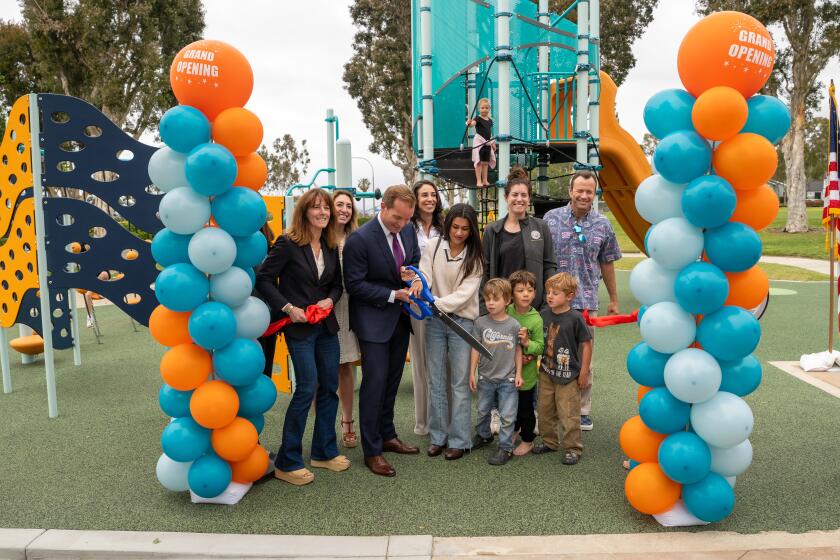Sickly fumes
- Share via
Bryce Alderton
They say the fumes make them close the windows to their homes and have
caused unwanted coughing and wheezing.
A group of several residents were not about to let their thoughts go
unnoticed.
They spoke during last week’s Huntington Beach City Council meeting,
complaining of nauseating fumes coming from the Cambro Manufacturing Inc.
plant on Clay Avenue.
They say invisible, noxious odors coming from the nearby factory are
making them gravely ill with coughing fits, sore throats and shortness of
breath, and want the nauseating emissions to stop.
These symptoms and the oily soot they say sticks to their cars,
driveways and houses have them worried about their health, said J.M.
Lopez.
Lopez, 48, has lived in the same house on Clay Avenue all his life.
His family first moved into the area in the 1920s, before Cambro built
its plant there in 1961.
Cambro, which also has a plant on Skylab Road, a more industrial area
of Huntington Beach, makes plastic and Styrofoam plates, cups and bowls
and containers to transport food. Cambro officials did not return phone
calls.
Lopez and others have long complained that the plant is not a good fit
for a residential area and wants it out of the neighborhood.
“The stench sticks back to your palette,” he said. “It’s gotten out of
hand. We have problems with breathing and we don’t know what chemicals
are coming out [of the plant].”
Lopez first began noticing odors in the 1980s. He began writing
letters to city officials about the fumes and about noises he heard from
forklifts, trucks, saws and Cambro employees parking on Clay and
Huntington streets 24 hours a day.
In 1983 officials from the South Coast Air Quality Management District
determined that noise and fume levels coming from Cambro exceeded legal
limits, and Cambro officials were notified.
Dick Hammond, Cambro’s general manager in 1984, said he would comply
with the law and would hire a consultant to help reduce noises.
But residents say not much has changed.
Theresa Farrar has managed the 77-unit Huntington Manor apartment
complex since October 1999, and said some days and nights she can’t leave
the windows to her apartment open because of the fumes.
“The smell is gut-wrenching and there’s a black oily soot that ruins
everything and is everywhere,” she said. “We don’t know if [the
emissions] are contaminating our water. Something is happening and we
don’t know what it is.”
Since moving to Huntington Beach in 1999, Farrar claims that the
majority of her family -- herself, her husband Mark, and two of her three
daughters -- have suffered health problems, which they believe were
caused by the emissions from the Cambro plant.
“My 12-year-old daughter and myself are on asthma medication and my
husband has to use a breathing machine at night and he is a healthy guy,”
Farrar said.
Since 2000, the air quality management district received 12 complaints
from residents about the fumes and the noise, a number that far exceeds
the normal amount of complaints required before the district issues a
public nuisance violation, said Ed Pupka, senior compliance manager for
the district.
“We need more than one complaint, typically six to 10,” Pupka said.
“The idea [for issuing a public nuisance] is that it doesn’t happen
again. We’re asking our engineering staff to look at controlling
emissions.”
District officials most recently issued two citations to Cambro, a
public nuisance violation on March 7, and a citation in October 2001 for
operating a foam machine without a permit.
A public nuisance violation requires a company to fix whatever is
causing odors, said Sam Atwood, spokesman for the air quality management
district.
The district has the authority to shut a business down if it doesn’t
comply with acceptable standards, but the district hasn’t received any
complaints from residents about the fumes since March 7, Pupka said.
“The intent is to work with the company to make sure it doesn’t occur
again,” Pupka said. “[We want] to make sure there are no maintenance
problems and the equipment is running properly.”
All the latest on Orange County from Orange County.
Get our free TimesOC newsletter.
You may occasionally receive promotional content from the Daily Pilot.



